Over the last decade, the e-commerce business sector has seen immense growth, shifting business processes and increasing connections with customers globally. This expansion is largely driven by advancements in Software as a Service (SaaS) technologies, crucial for scaling businesses quickly, streamlining operations, and delivering exceptional customer experiences.
As the digital marketplace becomes more competitive, selecting the right SaaS tools is crucial, far beyond mere convenience. The right suite of tools simplifies complex processes such as inventory management, payment processing, and marketing tools, enabling businesses to focus on growth and customer satisfaction. This article highlights ten indispensable SaaS tools for e-commerce success, each chosen for its impact on operational efficiency, scalability, and enhancing the customer journey.
Now, let’s explore our curated list of the Top 10 Essential SaaS Tools Every E-Commerce Business Needs in 2024:
1. Shopify: A Comprehensive E-Commerce Solution

Shopify stands out with key features like customizable website templates and advanced features for inventory management, making it an essential collaboration tool for e-commerce businesses. Its integration with Google Drive for document management supports remote teams in maintaining effective communication.
Benefits for E-Commerce Businesses: Beyond simplifying online store management, Shopify’s platform is a powerful tool for enhancing customer experiences, boosting sales through marketing tools, and facilitating customer relationship management. Its ability to connect with social media platforms and manage social media posts is crucial for expanding social media campaigns and engaging potential customers.
Ease of Integration: Shopify’s integration with e-commerce systems and other SaaS tools is seamless, enhancing operational coherence.
User Experience: Known for its intuitive interface, Shopify offers a user-friendly experience that reduces the learning curve for new users. It caters to users of all technical backgrounds, ensuring anyone can manage an online store with ease.
Pricing Structure: Shopify’s pricing model accommodates businesses of all sizes, offering various subscription levels from basic to advanced, including Shopify Plus for enterprises needing more customization and support. Each plan is tailored to fit different stages of business growth, making Shopify a versatile and cost-effective option.
Customer Support and Resources: Shopify is committed to exceptional customer support, available 24/7 through email, phone, and live chat. It also provides a wealth of resources like tutorials, forums, and detailed documentation to help users maximize the platform.
Real-World Applications: From small startups to large brands, many e-commerce businesses have used Shopify to scale and succeed. These success stories often highlight Shopify’s ability to support business growth, feature richness, and positive impacts on sales and customer engagement.
Scalability: Designed to grow with your business, Shopify can effortlessly handle increases in products, traffic, and transactions, supporting businesses as they expand into new markets without sacrificing performance.
Security and Compliance Shopify prioritizes security, offering SSL certificates, PCI compliance, and strong data protection measures to secure customer transactions and data. This focus on security builds trust among businesses and their customers.
Pros and Cons
- Pros:
- Extensive e-commerce features and a wide app marketplace.
User-friendly for all skill levels. - Excellent integration and scalability.
- Extensive e-commerce features and a wide app marketplace.
- Cons:
- Costs can accumulate with advanced features and third-party apps.
- Some customization limits on lower-tier plans.
2. Magento: Customizable Platform for Growth
Magento, with its flexibility and powerful features, offers a wide range of advanced features for SEO optimization and customer experiences, making it a favorite among medium businesses and large enterprises alike. Its seamless integration with Google Workspace, including Google Docs and Google Calendar, enhances project management software capabilities and calendar management.
Benefits for E-Commerce Businesses: Magento supports scalability from startups to large enterprises, with advanced SEO and marketing tools increasing online visibility and attracting potential customers.
Ease of Integration: With its extensive API and a multitude of built-in integrations, Magento facilitates smooth connectivity with a variety of e-commerce systems and SaaS tools. This integration capability extends to payment gateways, shipping services, and Customer Relationship Management systems, allowing businesses to create a cohesive e-commerce ecosystem.
User Experience: Magento is powerful but has a steep learning curve, particularly for those without technical backgrounds. However, its administrative interface is designed for intuitive use after initial familiarization. The platform’s capacity for high-level customization can result in exceptional front-end user experiences.
Pricing Structure: Magento offers its Open Source edition for free, while Adobe Commerce provides additional features and support on a subscription basis. Adobe Commerce’s pricing is customized according to business size and needs, ensuring a cost-effective solution for diverse e-commerce operations.
Customer Support and Resources: Adobe Commerce users benefit from extensive support, including dedicated technical assistance, community forums, and a wealth of documentation. The vibrant Magento community also offers invaluable support, extensions, and themes.
Real-World Applications: A wide array of e-commerce businesses have successfully utilized Magento to develop and scale their online presence. Case studies highlight the platform’s adaptability, comprehensive functionality, and scalability as crucial to its success.
Scalability: Magento is renowned for its ability to support businesses through growth phases, managing large product catalogs, high traffic, and complex customizations efficiently.
Security and Compliance: Magento prioritizes security, offering regular updates to address vulnerabilities and supporting PCI compliance for safe payment processing. It also provides tools and practices for robust data protection.
Pros and Cons
- Pros:
- Exceptionally customizable and scalable.
- Comprehensive SEO, marketing, and site management features.
- Strong integration capabilities with extensive community support.
- Cons:
- Challenging for non-technical users to master.
- Significant development resources may be needed for customization.
- Potentially higher total cost of ownership compared to alternative platforms.
3. Gorgias: Enhancing Customer Service
Gorgias, a customer support team tool, centralizes customer services, offering live chat, task management, and video call functionality. This collaboration tool is designed to streamline customer interactions and boost customer satisfaction through personalized support.
Benefits for E-Commerce Businesses: Gorgias improves team efficiency, enhances customer experiences, and drives sales with better service. By offering insights into customers’ order histories, it enables personalized interactions, increasing loyalty and sales.
Ease of Integration: Gorgias integrates seamlessly with leading e-commerce platforms like Shopify, Magento, and WooCommerce. Its extensive API and integrations marketplace ensure easy connectivity, enabling a cohesive customer service approach.
User Experience: Known for its intuitive interface, Gorgias allows support teams to operate efficiently with minimal training. Its design ensures that necessary information is readily accessible for quick, informed customer responses.
Pricing Structure: Gorgias offers tiered pricing suitable for businesses of all sizes, providing subscription plans based on support ticket volume. This model allows businesses to select a plan that matches their needs, offering transparency and value.
Customer Support and Resources: Gorgias delivers excellent customer support alongside a wealth of resources like tutorials, webinars, and forums, aiding users in leveraging the tool to improve their customer service.
Real-World Applications: E-commerce businesses using Gorgias have seen marked improvements in response times and customer satisfaction. Case studies often note the platform’s role in reducing workload through automation and boosting sales through enhanced engagement.
Scalability: Designed to grow with businesses, Gorgias offers features that manage increasing inquiries and support needs, proving to be a scalable solution for expanding operations.
Security and Compliance: Gorgias prioritizes security and compliance, adopting industry-standard measures and adhering to regulations to ensure secure handling of customer data, maintaining trust and compliance.
Pros and Cons
- Pros:
- Specialized customer service platform with in-depth e-commerce integration.
- Intuitive interface for streamlined customer support.
- Scalable pricing based on ticket volume.
- Cons:
- Costs can increase with advanced features and higher ticket volumes.
- The e-commerce focus may limit use outside this sector.
4. SellTheTrend: Discovering Market Trends

Functionality and Key Features: SellTheTrend is not just a prospecting tool; it’s an analytics tool that identifies trending products and market demands. Its powerful analytics provide e-commerce businesses with detailed analytics, offering a competitive advantage by streamlining product selection and engaging potential customers effectively.
Benefits for E-Commerce Businesses: SellTheTrend gives e-commerce operations a competitive advantage by streamlining product selection, offering insights into customer demands, and driving sales with actionable data. It simplifies identifying and selling profitable products, significantly impacting profitability.
Ease of Integration: This tool smoothly integrates with leading e-commerce platforms like Shopify and WooCommerce. Its comprehensive APIs ensure quick synchronization of products, orders, and analytics, facilitating a seamless transition from product discovery to sales.
User Experience: Known for its intuitive interface, SellTheTrend allows easy access to its extensive features without extensive training. Its dashboard provides clear insights into trends and analytics, making decision-making straightforward for e-commerce managers.
Pricing Structure: SellTheTrend uses a subscription model, providing plans that fit various business sizes and needs. Offering a trial period, the platform demonstrates its value and cost-effectiveness for businesses eager to expand their product offerings.
Customer Support and Resources: Exceptional customer support complements the platform, with a dedicated team accessible through multiple channels. Users also benefit from tutorials, forums, and a knowledge base designed to help maximize the tool’s potential.
Real-World Applications: Many e-commerce businesses have utilized SellTheTrend to revolutionize their product sourcing strategy, achieving substantial sales growth. Success stories often focus on the platform’s ability to pinpoint lucrative niches and trends, leading to enhanced revenue.
Scalability: Designed with growth in mind, SellTheTrend offers analytics and insights that grow with your business. It ensures e-commerce operations can continuously access new, trending product ideas, maintaining a competitive edge.
Security and Compliance: SellTheTrend is committed to user data protection and transaction security, adhering to e-commerce regulations and best practices to maintain trust and integrity.
Pros and Cons
- Pros:
- Provides AI-driven insights for strategic product selection.
- Features an intuitive, user-friendly interface.
- Seamlessly integrates with major e-commerce platforms.
- Cons:
- Subscription costs may deter smaller businesses.
- The wealth of data and features might initially overwhelm newcomers.
5. Retention: Driving Customer Loyalty for E-Commerce

Functionality and Key Features: Retention boosts customer loyalty with personalized email campaigns and detailed segmentation, providing valuable insights into buying behaviors.
Benefits for E-Commerce Businesses: This tool offers e-commerce operations a significant boost by streamlining processes, personalizing customer experiences, encouraging repeat purchases, and supporting growth with actionable insights. It strengthens customer relationships, leading to higher retention rates and revenue growth.
Ease of Integration: The Retention Tool integrates smoothly with leading e-commerce platforms and SaaS tools, providing built-in connections and an open API for custom integrations. This ensures businesses can enhance their retention strategies seamlessly within their current e-commerce framework.
User Experience: With its intuitive interface, the Retention Tool allows for easy navigation and campaign management, accessible even with minimal training. Its dashboard delivers clear insights into retention metrics and customer behavior, aiding in informed strategy development.
Pricing Structure: Featuring a tiered pricing model, the tool caters to various business sizes with potentially free options for small businesses and customizable packages for larger operations. This approach guarantees cost-efficiency for e-commerce businesses focused on long-term customer value.
Customer Support and Resources: Responsive customer support complements the platform, supplemented by comprehensive tutorials and forums. These resources are designed to help users fully leverage retention strategies for maximum benefit.
Real-World Applications: E-commerce businesses utilizing the Retention Tool have seen marked improvements in customer loyalty, with notable case studies illustrating significant boosts in repeat purchase rates and revenue. The tool’s ability to translate data into actionable strategies is highly valued.
Scalability: The tool is built to accommodate business growth, offering features and analytics that scale with increasing customer bases and more complex retention efforts, ensuring ongoing enhancement of customer loyalty.
Security and Compliance: Security and regulatory compliance are priorities, with stringent data protection measures in place to ensure customer information is secure and transactions comply with e-commerce standards.
Pros and Cons
- Pros:
- Specializes in boosting customer lifetime value through retention strategies.
- Offers an intuitive interface for easy strategy implementation.
- Provides flexible pricing and scalable solutions for all business sizes.
- Cons:
- Requires a grasp of analytics for advanced feature utilization.
- May need custom integration for specific setups, adding complexity.
6. Zoho Inventory: Streamlining Inventory Management
Functionality and Key Features: Zoho Inventory, with its real-time tracking and multi-channel selling, integrates with cloud storage solutions like Google Drive, facilitating file sharing and document management. This tool supports inventory management and order fulfillment, enhancing customer satisfaction through efficient operations.
Benefits for E-Commerce Businesses: Zoho Inventory boosts e-commerce efficiency, ensures customer satisfaction through precise order fulfillment, and drives sales by providing clear visibility into stock levels and product performance. It supports business growth by automating key inventory management processes, allowing for seamless scalability.
Ease of Integration: Notable for its straightforward integration with leading e-commerce platforms and SaaS tools, Zoho Inventory features built-in integrations and a robust API. It syncs effortlessly with Shopify, Amazon, eBay, and Etsy, synchronizing inventory data across channels to streamline operations.
User Experience: Recognized for its user-friendly interface, Zoho Inventory simplifies inventory management with intuitive navigation, enabling quick adoption with minimal training required.
Pricing Structure: Zoho Inventory’s pricing is designed for businesses of all sizes, offering a free tier for startups and scalable subscription plans for growing businesses. This makes Zoho Inventory an affordable option for optimizing inventory management at any business scale.
Customer Support and Resources: Zoho Inventory ensures excellent customer support through various channels, complemented by an array of resources like tutorials, forums, and a detailed knowledge base, assisting users in fully leveraging the tool.
Real-World Applications: E-commerce businesses across the spectrum have harnessed Zoho Inventory to streamline their operations and fuel growth, with many reporting reduced stockouts, enhanced order accuracy, and efficient management of multi-channel sales.
Scalability: Designed with growth in mind, Zoho Inventory accommodates expanding product lines, increasing sales volume, and additional sales channels, facilitating effortless scaling.
Security and Compliance: Prioritizing security and compliance, Zoho Inventory implements strict data protection protocols and complies with relevant e-commerce regulations, ensuring the safe management of customer data and transactions.
Pros and Cons
- Pros:
- Comprehensive management of inventory.
Intuitive and accessible user interface. - Cost-effective with a free tier available.
- Comprehensive management of inventory.
- Cons:
- As businesses expand, they may need advanced features, leading to higher costs.
- While integration is broad, maximizing its benefits may require some technical know-how.
7. Stripe: Simplifying Online Payments

Functionality and Key Features: Stripe revolutionizes e-commerce payments with its seamless integration capabilities and robust APIs, supporting a variety of online payments and subscription billing. Its extensive features and customization options make it a popular tool for businesses of all sizes, from startups to enterprise plans.
Benefits for E-Commerce Businesses: Stripe boosts e-commerce operations by streamlining payment efficiency, enhancing the checkout experience, and directly contributing to increased sales through improved conversion rates. Its scalable solutions support business growth, while the streamlined payment process effectively reduces cart abandonment.
Ease of Integration Known for its straightforward integration, Stripe offers built-in connections and a comprehensive API suite, ensuring easy linkage with popular e-commerce systems. This hassle-free integration fosters a unified payment ecosystem, simplifying the setup for businesses.
User Experience Stripe is renowned for its intuitive interface, simplifying transactions for businesses and customers alike. Designed for ease of use, it requires minimal training, making the payment process straightforward and enhancing the overall shopping experience.
Pricing Structure Stripe’s transparent pricing model includes competitive transaction rates without monthly fees or hidden charges, making it a cost-effective solution for e-commerce businesses. Custom pricing is available for businesses with unique needs or high-volume transactions.
Customer Support and Resources Stripe excels in customer support, providing a responsive team accessible via email, chat, and phone. Additionally, a wealth of documentation, tutorials, and forums are available, offering guidance and support for maximizing platform use.
Real-World Applications: Many e-commerce businesses have utilized Stripe to improve their payment processing and drive growth. Success stories highlight increased sales conversions, streamlined operations, and a superior payment experience for potential customers.
Scalability: Designed for growth, Stripe accommodates expanding businesses, managing increased payment volumes and complex financial operations with ease. Its infrastructure ensures reliability and efficiency at every stage of business development.
Security and Compliance: they are top priorities for Stripe, which adheres to stringent protocols and complies with PCI DSS and other relevant regulations. This commitment ensures the secure processing of customer payments, building trust, and protecting business integrity.
Pros and Cons
- Pros:
- Advanced customization and seamless integration capabilities.
- Intuitive interface that simplifies the payment process.
- Transparent pricing with competitive rates.
- Cons:
- Advanced customizations may require technical expertise.
- Transaction fees may be higher for businesses with large volumes, compared to other solutions.
8. Klaviyo: Mastering Marketing Automation
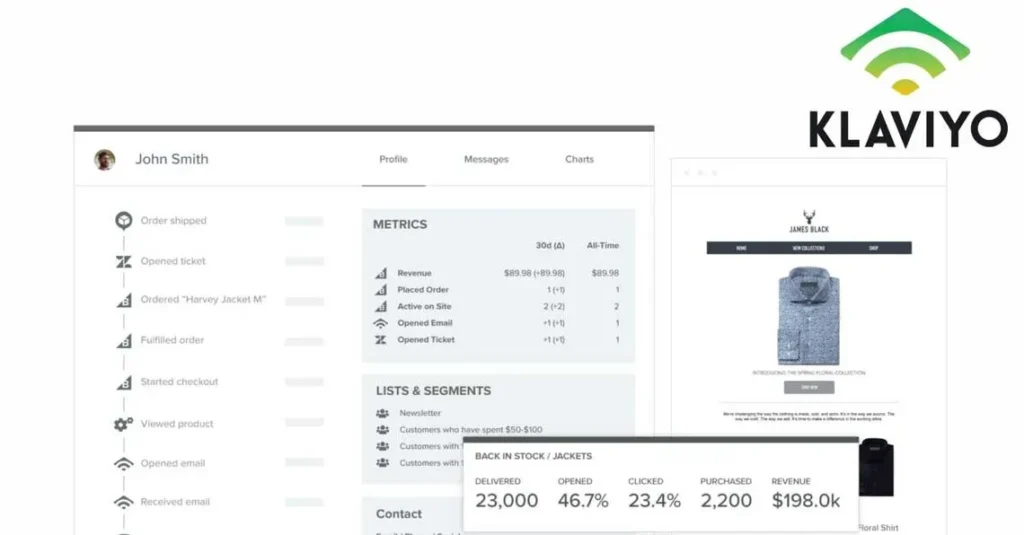
Functionality and Key Features: Klaviyo, a marketing tools powerhouse, leverages analytics tools to offer personalized, targeted email and SMS campaigns. It excels in customer retention by utilizing data on customer journeys to tailor marketing efforts, enhance customer interactions and drive sales.
Benefits for E-Commerce Businesses: Klaviyo enhances marketing efficiency, personalizes interactions, and drives sales through focused campaigns. It supports scalable marketing efforts, allowing businesses to grow their outreach in line with their customer base. By utilizing customer data for tailored marketing, Klaviyo increases retention and customer lifetime value.
Ease of Integration: Seamless integration with leading e-commerce platforms such as Shopify, Magento, and WooCommerce, alongside a comprehensive API, makes Klaviyo a breeze to connect and implement, facilitating sophisticated marketing strategies without the need for extensive technical resources.
User Experience: Klaviyo’s interface is user-friendly, featuring intuitive navigation and a drag-and-drop email builder, making it accessible for all skill levels. The platform is crafted to streamline campaign creation and management with minimal training.
Pricing Structure: With pricing based on the number of contacts and messages, Klaviyo offers a scalable solution, including free tiers for smaller lists. This approach ensures that Klaviyo remains a cost-effective choice for e-commerce businesses of any size, accommodating growth without disproportionate cost increases.
Customer Support and Resources: Klaviyo excels in customer support, providing a responsive team and extensive educational resources such as tutorials and webinars. An active community forum further supports users in refining their marketing strategies.
Real-World Applications: E-commerce businesses utilizing Klaviyo report notable successes, including increased email engagement, higher conversion rates, and revenue growth. The platform’s capacity to transform data into actionable insights is often highlighted as a critical success factor.
Scalability: Designed for growth, Klaviyo offers features and analytics that evolve with your business, supporting expanding customer bases and complex marketing initiatives. It ensures that marketing remains effective, regardless of business size.
Security and Compliance: Klaviyo prioritizes data security and regulatory compliance, adopting strict measures to protect customer information and ensure transactions meet e-commerce and privacy standards.
Pros and Cons
- Pros:
- Delivers advanced segmentation for personalized campaigns.
- Features an intuitive interface for easy marketing management.
- Provides flexible, scalable pricing for businesses at every stage.
- Cons:
- Costs can rise for businesses with large contact lists.
- The extensive features and data may require a learning curve for newcomers.
9. PayPal: Trusted Payment Processing

Functionality and Key Features: PayPal, known for its security and user-friendly interface, offers frictionless checkout experiences. Its extensive features for transaction processing and ability to improve conversion rates underscore its role in customer satisfaction and retention.
Benefits for E-Commerce: Businesses PayPal enhances e-commerce operations by streamlining transactions, improving the checkout experience, and potentially increasing sales through its reputable brand. It supports business growth by effortlessly handling varying transaction volumes, and maintaining high levels of service and security.
Ease of Integration: Known for its straightforward integration, PayPal seamlessly connects with numerous e-commerce platforms and SaaS tools. Its comprehensive API and range of plugins ensure easy setup and integration, enriching the e-commerce ecosystem without complex processes.
User Experience: Renowned for its user-friendly interface, PayPal offers intuitive navigation that simplifies payments for businesses and customers. Its simplicity and minimal training requirements make it a top choice for e-commerce entities of any size.
Pricing Structure: PayPal’s pricing is clear, based on per-transaction fees without monthly charges for basic services. It provides competitive rates and customizable plans tailored to specific business needs, ensuring affordability for diverse e-commerce operations.
Customer Support and Resources: PayPal is committed to strong customer support, providing assistance through various channels. Alongside direct support, it offers an array of tutorials, forums, and community support, facilitating platform navigation and issue resolution.
Real-World Applications: Many e-commerce businesses have adopted PayPal to refine their payment processing and bolster customer confidence. Success stories frequently cite improved conversion rates and enhanced customer satisfaction due to PayPal’s reliable and secure payment options.
Scalability: Designed for growth, PayPal adapts to businesses at any scale, accommodating increasing transactions and expanding markets. Its global reach and financial services empower businesses to explore new opportunities and scale efficiently.
Security and Compliance: Security and regulatory compliance are top priorities for PayPal, which implements advanced encryption and anti-fraud technologies. Adhering to strict regulations ensures secure processing of customer data and payments, upholding trust and legal compliance.
Pros and Cons
- Pros:
- Broad consumer trust and acceptance.
- Straightforward interface and payment process.
- Competitive pricing with transparent fees.
- Cons:
- Fees may add up for businesses with high sales volumes.
Instances of account hold and freezes can disrupt operations.
- Fees may add up for businesses with high sales volumes.
10. Mailchimp: Automating Marketing Efforts
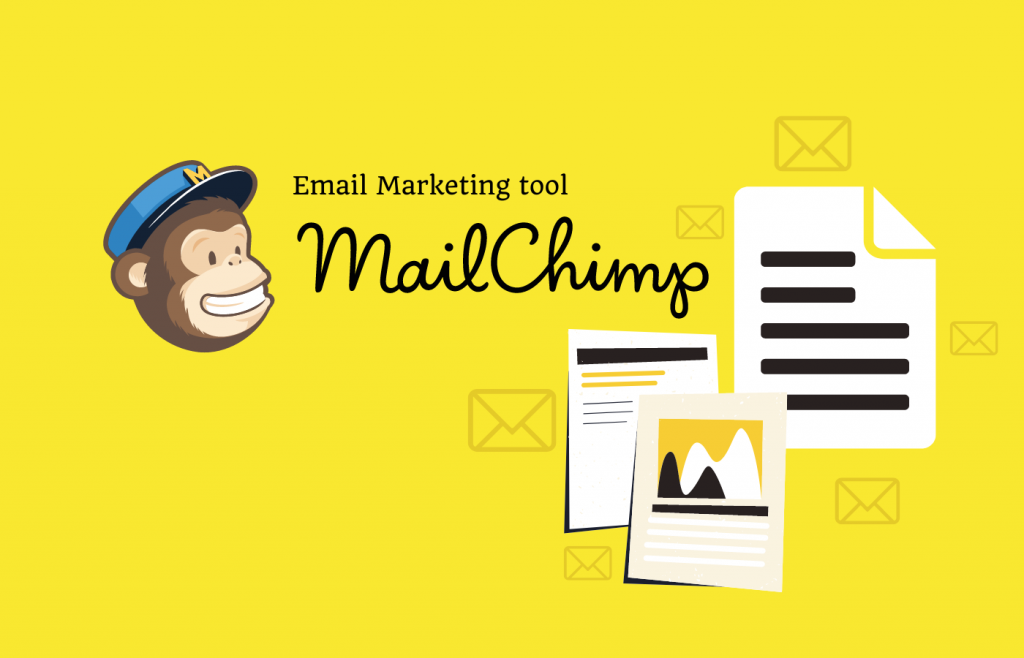
Functionality and Key Features: Mailchimp’s suite of marketing tools manages email campaigns and audience engagement. It’s vital for remote teams aiming to enhance their social media management and customer relationships, providing powerful tools for automating marketing efforts and generating valuable insights.
Benefits for E-Commerce: Businesses Mailchimp boosts e-commerce operations by streamlining marketing processes, enabling personalized customer interactions, driving sales through actionable insights, and facilitating scalability. It empowers businesses to connect with customers effectively, increasing the likelihood of conversion and fostering repeat business.
Ease of Integration: With smooth integration capabilities, Mailchimp connects effortlessly with leading e-commerce platforms and SaaS tools. Its rich API and extensive marketplace of apps allow for the synchronization of customer and sales data, creating a unified marketing ecosystem that improves campaign impact.
User Experience: Known for its intuitive interface, Mailchimp simplifies the creation of professional-looking campaigns with minimal effort. Its drag-and-drop email builder and array of templates make it accessible to users of varying expertise, streamlining the marketing workflow.
Pricing Structure: Offering a free tier for small ventures and scalable subscription plans, Mailchimp’s transparent pricing adapts to the size of your contact list, presenting a cost-effective solution for maximizing marketing resources across business scales.
Customer Support and Resources: Mailchimp’s commitment to support is evident through its responsive team and a wealth of educational content, including tutorials and guides. This, combined with a vibrant community forum, ensures users can fully utilize the platform’s capabilities.
Real-World Applications: E-commerce businesses have utilized Mailchimp to significant effect, achieving improved engagement and increased sales. Success stories highlight the platform’s effectiveness in enhancing email marketing strategies and automating essential marketing tasks.
Scalability: Designed with growth in mind, Mailchimp supports expanding marketing needs, providing the necessary tools to manage increasing demands, from growing contact lists to more sophisticated campaign strategies.
Security and Compliance: Mailchimp prioritizes data security and regulatory compliance, employing robust measures to protect customer information and ensuring businesses can trust their sensitive data with the platform.
Pros and Cons
- Pros:
- Extensive tools for marketing automation and email campaigns.
- Intuitive platform design simplifies campaign creation.
- Cost-effective pricing, including a free option for startups.
- Cons:
- Costs for advanced features and larger plans can escalate.
- The wide array of features may initially overwhelm new users.
Final Thoughts
Our guide has spotlighted nine key tools, from Stripe’s streamlined payment processing to Mailchimp’s targeted marketing efforts. These tools are important for any e-commerce business looking to enhance their operations and expand their market presence.
At Bounty Hunter, we focus on the need for a thorough assessment of your tech stack. Integrating these exceptional solutions is a strategic step toward boosting your e-commerce capabilities, addressing a wide range of needs from engaging customers to managing inventory efficiently.
Moving Strategically Forward
Choosing the right SaaS tools involves a detailed analysis of how each solution aligns with your business objectives and operational requirements. The e-commerce sector is constantly evolving, necessitating tools that are not only effective today but also scalable for future challenges.
We encourage a deep dive into these platforms to understand their full potential. Scheduling consultations or demos with SaaS providers can shed light on how these tools can enhance your business operations and help achieve your strategic aims. Bounty Hunter is here to guide you through these decisions, making sure your e-commerce business is well-positioned for success.
Explore the capabilities of these recommended SaaS tools to see how they can improve your business’s efficiency, drive growth, and give you a competitive advantage in the dynamic e-commerce landscape.
Related articles:
Best SaaS User Adoption Tools You Should Try
The Ultimate List of Software Solutions That Improve Product Managers’ Efficiency
Key SaaS Product Management Metrics and KPIs you should Track








